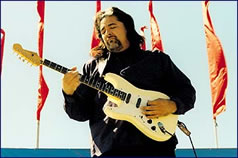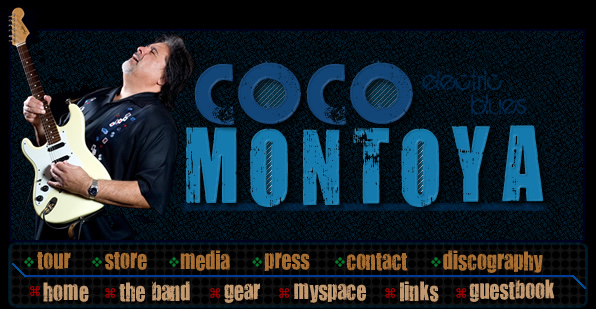| "Blistering contemporary blues...piercing
attack, funky, shivery guitar tones and aggressive, soulful
vocals" -Blues Revue "In
a world of blues guitar pretenders, Coco Montoya is the
real McCoy. Be prepared to get scorched."-Billboard
Over the course of his 30-year career, guitarist
and vocalist Coco Montoya's explosive guitar playing and
soul-driven voice have propelled him to the upper reaches
of the blues-rock world. From his early days as a drummer
to his current status as one of the top-drawing guitarists
and vocalists on the blues-rock scene, Montoya has forged
his reputation through years of hard work and constant touring.
And it all started with a chance meeting in the mid-1970s
with legendary bluesman Albert Collins, who offered Montoya
a gig as his drummer. Albert took an immediate liking to
Montoya, becoming his mentor and teaching his new protégé
secrets of the Collins "icy hot" style of blues
guitar. Five years later, John Mayall happened to catch
Montoya at a jam session and was blown away. This led to
Montoya's touring the world for ten years with the legendary
Bluesbreakers. Since stepping out as a bandleader in 1993,
Montoya has released four solo albums and has performed
non-stop at clubs, concert halls and major festivals all
over the world. At every show, fans' jaws dropped, and critics
raved about Montoya's mind-bending guitar licks and impassioned
vocals. "The fiery blues that issue forth from Coco
Montoya's guitar are awe-inspiring and boogie requiring,"
shouted The Village Voice. "Blistering, pure blues,"
cheered Blues Revue. Now, with Can't Look Back (AL 4885),
Montoya turns up the intensity with another dose of his
feral, soul-stirring music.
On Can't Look Back, Montoya once again uses
blues as a blasting off point for his rock solid, groove-laden
music. With his icy hot guitar playing and his soulful,
unaffected vocals, Montoya attacks each of the 13 songs
with deep feeling and ferocious energy. Produced by Jim
Gaines (Luther Allison, Santana, Stevie Ray Vaughan), every
song on Can't Look Back (including five Montoya originals)
burns from start to finish. From the scorching Wish I Could
Be That Strong to the grooves and passion of Trip, Stumble
And Fall to the ear-catching Can't Look Back to the reinvention
of Albert Collins' Same Old Thing, Montoya brings all the
unbridled force of his acclaimed live shows into the studio
for a foot-stomping, guitar-fueled ride.

Coco Montoya was born in Santa Monica, California
in 1951 and raised by working class parents with a large
record collection. As a youngster, he enjoyed picking out
notes on the guitar, but he grew up playing drums in local
rock bands. In 1969, Montoya saw Albert King opening up
a Creedence Clearwater Revival/Iron Butterfly concert and
was transformed. "After Albert got done playing,"
says Montoya, "my life was changed. When he played,
the music went right into my soul. It grabbed me so emotionally
that I had tears welling up in my eyes. Nothing had ever
affected me to this level. He showed me what music and guitar
playing were all about. I knew that was what I wanted to
do."
By the mid-1970s, Montoya was playing drums
in several local rock bands, one of which played a small
Culver City, California bar on weekends. One Sunday, Albert
Collins was booked to play a matinee there and the club
owner gave Collins permission to use Montoya's drums. Montoya
continues the story: "I show up to pick up my equipment
and I see that someone had been playing my drums and I got
a little angry with the club owner. So Albert called me
up at the club and was real nice and apologetic. I went
down to see his show and it really just tore my head off.
The thing that I had seen and felt with Albert King came
pouring back on me when I saw Albert Collins."

A few months later, Albert desperately needed
a drummer for a tour of the Northwest and he called Coco.
"When he called," recalls Coco, "I figured
we'd rehearse for a few weeks before the tour. Instead,
he told me he'd pick me up in three hours." During
the tour, Albert took Montoya under his wing, teaching him
about the blues. After the tour ended, Montoya remained
in Collins' band for five more years. It was during this
time that Coco began doubling on guitar. And Collins went
out of his way to teach the youngster. "We'd sit in
hotel rooms for hours and play guitar," remembers Montoya.
"He'd play that beautiful rhythm of his and just have
me play along. He was always saying, 'Don't think about
it, just feel it.' He taught me to tap into an inner strength.
What a great gift he gave me." As Montoya's guitar
playing improved, his relationship with Collins kept growing.
"He was like a father to me," says Coco, who often
crashed at Collins' house. When Collins declared Montoya
his "son," it was the highest praise and affection
he could offer. In return, Montoya learned everything he
could from the legendary Master of the Telecaster.

As disco began to take over and gigs began
to dry up, Montoya left Collins' band, but the two stayed
very close friends. Montoya worked as a bartender, figuring
his career as a musician was over. But luck was still on
his side. He kept playing guitar ("I had plenty of
time on my hands," Montoya recalls) and eventually
others took note of his prowess. One night in the early
1980s, Montoya was jamming in a Los Angeles bar when John
Mayall walked in. As a quick tribute, Montoya launched into
All Your Love I Miss Loving. Impressed, Mayall left the
club with a soundboard tape. When Mayall needed a guitarist
for the newly reformed Bluesbreakers, he called Coco Montoya.
Filling the shoes of previous Bluesbreaker guitarists Eric
Clapton, Peter Green and Mick Taylor would not be easy,
but Montoya knew he could not pass up the opportunity to
play with another blues legend. He joined the band, determined
to become an even greater guitarist. For the next ten years
he toured the world and recorded with Mayall, soaking up
everything he could. Along with fellow Bluesbreaker guitarist
Walter Trout, Montoya was a featured member of the band,
and often opened shows with his own blistering blues. And
like the great guitarists who came before him in the Bluesbreakers,
Montoya's emergence as a scalding hot player with chops
to burn suggested big things to come.
By the early 1990s, Montoya was at another
crossroads. He had been with the Bluesbreakers for ten years
and felt ready for a change. His friend Albert Collins had
been diagnosed with cancer, and during one visit, Collins
told Coco to move on and do his own thing. Montoya talked
to Mayall, who understood the time was right. "Both
Albert and John pushed me out of the nest nice and easy,"
says Coco. Although he was nervous about the move, Montoya
put a band together and hit the road, proving himself night
after night. His debut as a leader, 1995's Gotta Mind To
Travel (originally on Silvertone Records in England and
later issued in the USA on Blind Pig Records), became an
instant favorite with blues fans, radio programmers and
critics. The album introduced Montoya as a bandleader who
immediately ranked among the best players on the contemporary
blues scene. In 1996, he was nominated for four W.C. Handy
Awards and walked away with the award for Best New Blues
Artist.

Montoya's follow-up, 1996's Ya Think I'd Know
Better (Blind Pig), showcased a feral blues rocker with
vocal skills matched only by his ferocious guitar playing.
The album stayed on the Billboard Blues Chart for 14 weeks,
reaching the number 10 position. The Washington Post called
the CD, "One of the year's strongest blues-rock albums."
1997's Just Let Go (Blind Pig) continued to highlight Montoya's
steely guitar licks and intense vocals, earning him legions
of new fans everywhere he played. "He sings and plays
with passionate abandon," shouted the Boston Globe.
In 2000, Coco's Alligator debut, Suspicion,
quickly became the best-selling album of his career. "Powerhouse
blues," exclaimed Guitar Player, "searing tone,
emotional soloing, and energetic, unforced vocals…stunning."
With regular radio airplay on over 120 stations nationwide,
Montoya's fan base exploded. The record held the number
one position on the Living Blues radio chart for three straight
months. And it landed on the Billboard Blues Chart for 11
weeks in a row, peaking at number 11. Features and reviews
ran in Billboard, Guitar Player, The New York Times, Blues
Revue, JazzTimes, The Chicago Tribune, and countless other
national and regional publications.
Averaging over 200 tour dates a year, Montoya
packs clubs and theaters around the world. He has played
major festivals, including the New Orleans Jazz & Heritage
Festival, The Chicago Blues Festival, The San Francisco
Blues Festival and Canada's Inter-national Jazz Festival.
It's no coincidence that publications from The Philadelphia
Daily News to Blues Revue to Living Blues to The Village
Voice all rank Coco among the best guitarists and singers
on the blues scene. "Montoya is at the forefront of
the contemporary blues world," declared Guitar World.
"He is one of the truly gifted blues artists of his
generation," said Living Blues. With Can't Look Back
and continued non-stop touring, Coco Montoya is blasting
head first into the future, and he's bringing everyone along
for the fiery, blues-rocking ride. |

